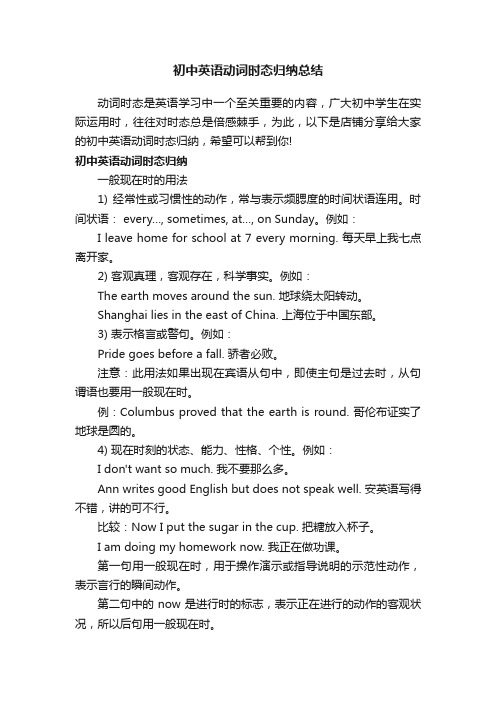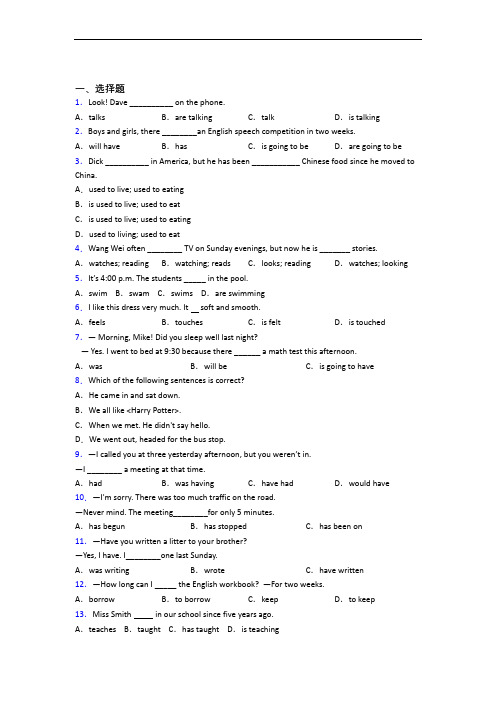初中英语语法知识—动词时态的分类汇编(1)
初中英语动词时态归纳总结

初中英语动词时态归纳总结动词时态是英语学习中一个至关重要的内容,广大初中学生在实际运用时,往往对时态总是倍感棘手,为此,以下是店铺分享给大家的初中英语动词时态归纳,希望可以帮到你!初中英语动词时态归纳一般现在时的用法1) 经常性或习惯性的动作,常与表示频腮度的时间状语连用。
时间状语:every…, sometimes, at…, on Sunday。
例如:I leave home for school at 7 every morning. 每天早上我七点离开家。
2) 客观真理,客观存在,科学事实。
例如:The earth moves around the sun. 地球绕太阳转动。
Shanghai lies in the east of China. 上海位于中国东部。
3) 表示格言或警句。
例如:Pride goes before a fall. 骄者必败。
注意:此用法如果出现在宾语从句中,即使主句是过去时,从句谓语也要用一般现在时。
例:Columbus proved that the earth is round. 哥伦布证实了地球是圆的。
4) 现在时刻的状态、能力、性格、个性。
例如:I don't want so much. 我不要那么多。
Ann writes good English but does not speak well. 安英语写得不错,讲的可不行。
比较:Now I put the sugar in the cup. 把糖放入杯子。
I am doing my homework now. 我正在做功课。
第一句用一般现在时,用于操作演示或指导说明的示范性动作,表示言行的瞬间动作。
第二句中的now是进行时的标志,表示正在进行的动作的客观状况,所以后句用一般现在时。
一般过去时的用法1)在确定的过去时间里所发生的动作或存在的状态。
例如:时间状语有:yesterday, last week, an hour ago, the other day, in 1982等。
初中动词时态归纳

以辅音字母加y结尾的改y 为i再加es
study-studies cry-cries carry-carries fly- flies
?关键词:动词 的单数第三人 称形式
练兵场
? 1. The shop ___ at 7:30 p.m. on weekends.
A. will close B. closes C. closed D. has closed
taught
练兵场
? 1. ---Susan, why are you still here? They are all ready to start.
? ---I'm sorry, but I _____when to meet.
? A. don't tell B. didn't tell ? C. haven't told D. wasn't told
?关键词:动词 的过去式
过去式
? need-needed ? laugh-laughed ? carry-carried ? cry-cried ? stop-stopped ? like-liked ? prefer-
preferred
? be-was/were ? say-said ? see-saw ? have-had ? forget-forgot ? know-knew ? catch-caught ? teach-
What a teenager!
One
!
?2.—I have finished my homework. —When ___ you ___ it ?
A. have; finished
B. do; finish
初中英语知识归纳总结——动词的时态

初中英语知识归纳总结——动词的时态动词的时态(一)教学重点一般现在时在英语中,不同时间里以不同方式发生的动作或存在的状态,要用不同的动词形式来表示,动词的这种不同形式称为动词的时态。
时态从时间上划分,可分为四大类:现在时;过去时;将来时;过去将来时。
从行为上,每一类可以分为四种形式:一般式;进行式;完成式;完成进行式。
这样英语的动词合起来,总共有十六种时态,初中只需掌握其中的八种时态。
1、一般现在时(1)一般现在时表示现在的状态、习惯性的动作或主语所具备的性格和能力等。
①当动词是be时,第一人称用am,第二人称用is,其他人称用are.②当动词是实义动词时,一般用动词原形,但如果主语是第三人称单数时,动词必须用第三人称单数形式,其变化规则如下:助动词do(第三人称单数用does)构成否定句、疑问句及答语,但要注意助动词后原来的谓语动词要恢复原形。
例如:I like music.I don’t like music.Do you like music?Yes, I do No, I don’t(2)一般现在时的用法①表示经常、习惯性动作,常和often, usually, every day, sometimes, always 等时间状语连用。
如:He goes to school by bus every day.They often play football②表示能力、职业、特征。
如:Miss Gao teaches English.Do you speak Japanese?③表示客观存在。
如:The earth moves round the sun.Time and tide wait for no man.④表示已经安排好或计划好的事。
如The plane takes off at 7:30.Classes begin at 8:00⑤在时间状语和条件状语从句中,主句用一般将来时,从句用一般现在时。
初中英语知识点归纳动词的不同时态与语态

初中英语知识点归纳动词的不同时态与语态动词的不同时态与语态是初中英语的重要知识点。
掌握了动词的时态和语态,我们就能更准确地表达过去、现在和将来的动作,以及主语对动作的不同态度。
下面是对初中英语中动词的不同时态与语态的归纳总结。
一、动词的时态1. 一般现在时一般现在时表示经常性或习惯性的动作、客观真理、固定事件等。
例句:- I go to school every day.(我每天去上学。
)- The sun rises in the east.(太阳从东方升起。
)2. 现在进行时现在进行时表示现在正在进行的动作。
例句:- He is watching TV now.(他正在看电视。
)- They are playing basketball in the park.(他们正在公园里打篮球。
)3. 一般过去时一般过去时表示过去发生的动作或存在的状态。
例句:- We watched a movie last night.(昨晚我们看了一场电影。
)- She lived in Beijing when she was young.(她年轻时住在北京。
)4. 过去进行时过去进行时表示过去某个时间正在进行的动作。
例句:- They were having dinner at 7 o'clock yesterday.(昨天7点他们正在吃晚饭。
)- At this time last year, I was studying in London.(去年这个时间,我正在伦敦学习。
)5. 将来时将来时表示将要发生的动作或存在的状态。
例句:- We will go to the beach next week.(下周我们将去海滩。
)- She is going to visit her grandparents tomorrow.(她明天将要去看望她的祖父母。
)二、动词的语态1. 主动语态主动语态表示主语是动作的执行者。
英语中的六种时态(1)

动词六种时态概述:定义:表示动作、状态或性质的词称为动词。
动词按功能可分为四类:实义动词、系动词、助动词和情态动词。
动词按词义可分为终止性动词和持续性动词。
实义动词的五种基本形式:英语实义动词有五种基本形式:动词原形(do)、动词第三人称单数形式(does)、过去式(did)、过去分词(done)和现在分词(doing)。
这五种动词形式和助动词一起构成动词的时态,语态和语气。
1. 动词的原形。
就是词典中所给的形式。
例如:be,have,buy,sit.2. 动词第三人称单数形式仅用于主语为第三人称单数的一般现在时态的句子。
构成方法如下:(1)一般加-s,如helps, reads(2)以s, ch, sh,x,o字母结尾的动词,加-es。
watch- watches, fix-fixes(3)以“辅音字母+y”结尾的动词,把y改为i,再加-es。
study-studies(4)以“元音字母+y”结尾的动词,在词尾加-s。
play-plays, stay-stays3. 动词过去式和过去分词的构成有规则的和不规则的两种形式。
(1)一般情况下,动词词尾加-ed 如:worked,played,wanted,(2)以不发音的-e 结尾的动词,动词词尾加-d。
如:lived,moved(3)以辅音字母+ y结尾的动词,把-y变为-i 再加-ed。
如:studied,tried,copied(4)以一个辅音字母结尾的重读闭音节动词,双写词尾辅音字母加-ed。
如:stopped,dropped (5)不规则动词的过去式变化规律性不强,须多加记忆。
(见每册书后面的附录)go – went4. 动词的现在分词由动词原形加-ing 构成。
构成方法如下:(1)一般情况在动词原形后加-ing 。
go - going(2)以不发音的e 结尾的动词,去掉 e ,再加–ing。
arrive- arriving(3)重读闭音节的动词,需双写辅音字母再加ing。
初中英语语法知识—动词时态的真题汇编及解析(1)

一、选择题1.Look! Dave __________ on the phone.A.talks B.are talking C.talk D.is talking 2.Boys and girls, there ________an English speech competition in two weeks.A.will have B.has C.is going to be D.are going to be 3.Dick __________ in America, but he has been ___________ Chinese food since he moved to China.A.used to live; used to eatingB.is used to live; used to eatC.is used to live; used to eatingD.used to living; used to eat4.Wang Wei often ________ TV on Sunday evenings, but now he is _______ stories. A.watches; reading B.watching; reads C.looks; reading D.watches; looking 5.It’s 4:00 p.m. The students _____ in the pool.A.swim B.swam C.swims D.are swimming6.I like this dress very much. It soft and smooth.A.feels B.touches C.is felt D.is touched 7.— Morning, Mike! Did you sleep well last night?— Yes. I went to bed at 9:30 because there ______ a math test this afternoon.A.was B.will be C.is going to have 8.Which of the following sentences is correct?A.He came in and sat down.B.We all like <Harry Potter>.C.When we met. He didn't say hello.D.We went out, headed for the bus stop.9.—I called you at three yesterday afternoon, but you weren’t in.—I ________ a meeting at that time.A.had B.was having C.have had D.would have 10.—I'm sorry. There was too much traffic on the road.—Never mind. The meeting________for only 5 minutes.A.has begun B.has stopped C.has been on 11.—Have you written a litter to your brother?—Yes, I have. I________one last Sunday.A.was writing B.wrote C.have written 12.—How long can I _____ the English workbook? —For two weeks.A.borrow B.to borrow C.keep D.to keep 13.Miss Smith in our school since five years ago.A.teaches B.taught C.has taught D.is teaching14.When I was young, my mother ___________ by my side all the time.A.stays B.is staying C.stayed D.will stay 15.—Remember the first time we met, Jim?—Of course I do. You ________ in the library.A.were reading B.have read C.will read D.read 16.Look at Amy. She ________ for the school bus.A.wait B.is waiting C.waits D.waiting 17.The water ______ cool when I jumped into the pool for morning exercise.A.was felt B.is felt C.felt D.feels 18.While I_______ a detective story, someone_______ at the door.A.read, was knockingB.read, knockedC.was reading, knockedD.was reading, was knocking19.---Where have you been recently?---I _______ in Hangzhou on business for a week last month.A.have been B.had gone C.had been D.was 20.It’s 8 o’clock. The students _________ an English class.A.have B.having C.is having D.are having 21.With a book in his hand, the boy ________ in bed.A.lie B.lied C.lay D.lying 22.Don’t talk! The baby ________.A.sleeps B.is sleep C.sleeping D.is sleeping 23.— What do you use MP3 for?— I ________ it ________ to music.A.use; listen B.are listening; listeningC.use; to listen D.is listening; to listening24.My father is a teacher and he ___________ in this school for about twenty years. A.works B.is working C.was working D.has worked 25.—How much is the ticket (票) to Central Park?—One ticket $40, and you can $80 for two persons.A.costs; pay B.cost; spend C.pay; spend D.spends; pay 【参考答案】***试卷处理标记,请不要删除一、选择题1.D【解析】【分析】【详解】句意:看!Dave正在打电话。
动词时态总结一览表
动词时态总结一览表现在时态- 一般现在时(Simple Present):表示经常性、惯性或普遍真理的动作或状态。
主语为第三人称单数时,动词需加 -s/-es 结尾。
一般现在时(Simple Present):表示经常性、习惯性或普遍真理的动作或状态。
主语为第三人称单数时,动词需加 -s/-es 结尾。
1. He drinks coffee every day. (他每天喝咖啡。
)2. They go to school by bus. (他们坐公交车上学。
)- 现在进行时(Present Continuous):表示正在进行的动作。
现在进行时(Present Continuous):表示正在进行的动作。
1. She is reading a book now. (她正在读书。
)2. We are watching TV at the moment. (我们现在正在看电视。
)- 现在完成时(Present Perfect):表示过去发生的动作对现在造成的影响。
现在完成时(Present Perfect):表示过去发生的动作对现在造成的影响。
1. I have finished my homework. (我已经完成了作业。
)2. They have lived here for two years. (他们在这里住了两年了。
)- 现在完成进行时(Present Perfect Continuous):表示动作从过去一直延续到现在。
现在完成进行时(Present Perfect Continuous):表示动作从过去一直延续到现在。
1. They have been playing basketball for two hours. (他们已经打了两个小时的篮球了。
)2. I have been studying English for five years. (我已经研究英语五年了。
)过去时态- 一般过去时(Simple Past):表示过去某个时间发生的动作或状态。
动词时态的种类及用法总结
动词时态的种类及用法总结动词时态是用来表示动作或状态发生的时间,表达出了一定的时间关系。
在英语中,动词时态分为简单时态、进行时态、完成时态和将来时态。
本文将分别介绍这四种时态的用法。
一、简单时态(Simple Tense)简单时态分为三个时态,分别是一般现在时、一般过去时和一般将来时。
1. 一般现在时(Simple Present Tense)一般现在时用来表示经常性的、习惯性的或普遍性的动作或状态。
示例:- I go to school every day.- She likes to play basketball.- Birds can fly in the sky.2. 一般过去时(Simple Past Tense)一般过去时用来表示过去某个具体时间发生的动作或状态。
示例:- He watched a movie yesterday.- We lived in that house for two years.- They visited their grandparents last weekend.3. 一般将来时(Simple Future Tense)一般将来时用来表示将来某个时间或将来会发生的动作或状态。
示例:- I will finish my homework tomorrow.- She is going to buy a new car next month.- They are leaving for vacation next week.二、进行时态(Progressive Tense)进行时态用于表示正在进行的动作或状态,并强调持续性和进行性。
1. 现在进行时(Present Continuous Tense)现在进行时表示现在正在进行的动作或状态。
示例:- He is talking on the phone right now.- They are studying for the exam at the library.- We are watching a movie tonight.2. 过去进行时(Past Continuous Tense)过去进行时表示过去某一时刻正在进行的动作或状态。
初中动词时态知识点总结
初中动词时态知识点总结动词时态是英语语法中的一个重要方面,它描述了动作或事件在不同的时间发生,表达动作的状态和行为发生的时间关系。
掌握动词时态对于学习和使用英语非常重要。
本文将总结初中动词时态的知识点,帮助大家更好地理解和运用。
一、一般现在时(Simple Present Tense)一般现在时描述经常性的动作、习惯、定律、客观事实等。
1. 表示经常性的动作或习惯- 主语 + 动词原形- I play football every weekend.- She reads books before going to bed.- We often visit our grandparents during the summer vacation.2. 表示客观事实、普遍真理等- 主语 + 动词原形- The sun rises in the east.- Water boils at 100 degrees Celsius.- Cats like to chase mice.二、一般过去时(Simple Past Tense)一般过去时描述过去已经发生并完成的动作、习惯、经历等。
1. 表示过去发生的动作或经历- 主语 + 动词过去式- I watched a movie last night.- She visited her friend yesterday.- We lived in London for five years.2. 表示过去的习惯- 主语 + used to + 动词原形- I used to go swimming every summer.- He used to play basketball when he was young.三、一般将来时(Simple Future Tense)一般将来时描述将来会发生的动作、计划、打算等。
1. 表示将来会发生的动作或计划- 主语 + will + 动词原形- I will visit my grandparents next week.- She will study abroad after finishing high school.- They will have a party for their anniversary.2. 表示意愿、决定和承诺- 主语 + be going to + 动词原形- I am going to start a new job next month.- He is going to learn how to play the guitar.- We are going to travel around the world in the future.四、现在进行时(Present Continuous Tense)现在进行时描述正在进行的动作、当前的情况和变化等。
初中英语语法八大时态总结(完整版)
初中英语语法八大时态一.一般现在时1.结构肯定句式:主语+动词原形/动词的第三人称单数+其他否定句式:主语+(助动词)don't/doesn't+动词原形+其他一般疑问句式:Do/Does+主语+动词原形+其他简略回答:(肯)Yes,主语+do/does(否)No,主语+do/does not缩写形式:don't=do not doesn't=does not例句:He often goes swimming in summer.I usually leave home for school at7every morning.2.用法1)表示经常的、习惯性的动作或存在的状态,常与表示频度的副词连用。
常用的频度副词有:always、often、usually、seldom、never、sometimes,every week(day,year, month…),once a week,on Sundays.频度副词在句中通常放在行为动词之前,系动词、助动词之后。
例如:He often goes swimming in summer.I usually leave home for school at7every morning.2)表示主语具备的性格、特征和能力等。
例如:All my family love football.My sister is always ready to help others.Ann writes good English but does not speak well.3)表示客观真理、客观存在、自然现象。
例如:The earth moves around the sun.Shanghai lies in the east of China.4)表示按计划或安排好的,或将要发生的动作,可用一般现在时表将来。
但只限于start,begin,leave,go,come,arrive,return,take place等。
- 1、下载文档前请自行甄别文档内容的完整性,平台不提供额外的编辑、内容补充、找答案等附加服务。
- 2、"仅部分预览"的文档,不可在线预览部分如存在完整性等问题,可反馈申请退款(可完整预览的文档不适用该条件!)。
- 3、如文档侵犯您的权益,请联系客服反馈,我们会尽快为您处理(人工客服工作时间:9:00-18:30)。
一、选择题1.Look! Dave __________ on the phone.A.talks B.are talking C.talk D.is talking 2.—Surprise! Cindy is singing in the concert.—But she ______.A.will refuse B.refusedC.refuses D.has refuse3.—Rose, can you give me a hand?—Just a minute. I ______ the followers.A.am watering B.have wateredC.watered D.water4.— How about going for a drive, Mike?— One moment, please! I __________ cleaning our room soon.A.will finish B.have finished C.finish D.finishes 5.Come on, John! You are too slow! Look, the parade _________ for fifteen minutes! A.started B.has started C.has been on D.has been open 6.No noise, please. Your brother ________ his homework in the next room.A.does B.is doing C.did D.has done7.It ________ heavily when I left the movie theater.A.rains B.was raining C.is raining D.will rain8.Dick __________ in America, but he has been ___________ Chinese food since he moved to China.A.used to live; used to eatingB.is used to live; used to eatC.is used to live; used to eatingD.used to living; used to eat9.Monica, you ______ the exam! Congratulation!A.pass B.have passedC.will pass D.are passing10.Sorry, Jenny isn’t here. She________ up some lights in the garden.A.put B.puts C.is putting D.has put 11.—How much is the ticket (票) to Central Park?—One ticket $40, and you can $80 for two persons.A.costs; pay B.cost; spend C.pay; spend D.spends; pay 12.—Look, Tom's parents look so sad.—Maybe they what's happened.A.knew B.have known C.has known D.will know 13.Nick's brother________the navy in 2011and ________the navy since then.A.joined; has joined B.joined in; has joined inC.joined in; has been in D.joined; has been in14.— How is your new coat?— Well, I __________ it on and it fits me well.A.try B.tried C.have tried D.had tried 15.Look at Amy. She ________ for the school bus.A.wait B.is waiting C.waits D.waiting 16.We were in Qingdao last spring and _______ great fun there.A.is having B.are having C.had D.have 17.— Mum, where is Dad?— He _________ flowers in the garden now.A.planted B.plants C.will plant D.is planting 18.—How did the accident happen?—You know, it was difficult to see the road clearly because it________.A.was raining B.has rained C.is raining D.will rain 19.With a book in his hand, the boy ________ in bed.A.lie B.lied C.lay D.lying 20.— What do you use MP3 for?— I ________ it ________ to music.A.use; listen B.are listening; listeningC.use; to listen D.is listening; to listening 21.Though the number of family cars ________ growing in most cities, the bicycle is still a popular way of going to school or work.A.are B.is C.were D.was22.It only __________ him 20 minutes __________ to his office every day.A.takes;to drive B.take;drive C.takes;drive 23.My father was reading ________ I was sleeping.A.while B.when C.before D.after 24.When I was young, my mother ___________ by my side all the time.A.stays B.is staying C.stayed D.will stay 25.— Could you please tell me yesterday?— In the bookshop nearby.A.Where you bought the book B.Where you buy the bookC.Where did you buy the book D.Where do you buy the book【参考答案】***试卷处理标记,请不要删除一、选择题1.D解析:D【解析】【分析】【详解】句意:看!Dave正在打电话。
本题中的look为看的含义,引起你的注意,使用进行时态,结构为be+doing,主语为单数第三人称,故用is,故本题选D。
2.B解析:B【解析】【分析】【详解】句意:——好意外!辛迪正在音乐会上唱歌。
——但是她(过去)拒绝。
考查一般过去时。
根据句意:好意外!辛迪正在音乐会上唱歌。
结合but,可知Cindy之前是拒绝的。
所以用一般过去时。
故答案为B。
3.A解析:A【解析】【分析】【详解】句意:——Rose,你能帮我一下吗?——等一下,我正在浇花。
考查现在进行时。
根据语境:“Rose,你能帮我一下吗?”“等一下,我______花。
”可推测是正在浇花,所以用现在进行时。
故答案为A。
4.A解析:A【解析】【分析】【详解】句意:——迈克,开车出去兜兜风怎么样? ——请等一会,我会很快打扫完我们的房间。
考查动词时态。
本句中有时间状语soon,表示“很快,不久”,故本句时态为一般将来时。
will finish一般将来时;have finished现在完成时;finish一般现在时;finishes一般现在时,主语为第三人称单数。
故选A。
5.C解析:C【解析】【分析】【详解】本题考查:动词用法。
选项分析: start是瞬间动词,非延续性动词.这类动词所表示的动作在瞬间就可以完成,不能延续下去,即动作从开始到结束所持续的时间极短.瞬间动词往往表示动作的结果,或表示短暂性、一次性的动作。
has been on可以表示持续的状态,依据后面的for fifteen minutes,可知是延续性状态,已经持续15分钟了。
综合分析前后句,可知此处填has been on最合适,完整句意为:Come on, John!来吧,约翰!You are too slow!你太慢了!Look, the parade has been on for fifteen minutes!瞧,游行已经进行了15分钟了!正确答案为:C【点睛】瞬间动词,也叫终止性动词、结束性动词、非延续性动词.这类动词所表示的动作在瞬间就可以完成,不能延续下去,即动作从开始到结束所持续的时间极短.瞬间动词往往表示动作的结果,或表示短暂性、一次性的动作。
【例词:close,leave,buy,join,become,begin,fall,fall ill,get to(know),come,go,see,hear,hear from,catch a cold】这类动词的肯定句在一般情况下,不能与表示一段时间的状语或疑问词连用.但是在否定句中,瞬间动词也可以和表示一段时间的状语、连词连用,它的含义是好长时间没进行这个动作了,没进行此动作的状态就可以延续.Eg: I haven't heard from my parents for a long time.我有好长时间没收到父母来信了。
6.B解析:B【解析】试题分析:句意:请不要大声喧哗。
你哥哥正在隔壁房间里写作业。
结合语境可知本句描述的是现在正在进行的动作,故用现在进行时态.。
请在此填写本题解析!故选B。
7.B解析:B【解析】【分析】【详解】句意:我离开电影院时,天正下着大雨。
